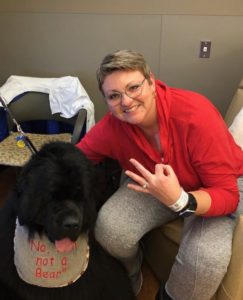At age 47, Tavia Crumpler knew something was off.
The increasing symptoms of bloating, gas, and changes in her stool consistency were especially disturbing since her grandmother had suffered from colon cancer, but Tavia chalked it up to stress. When the symptoms didn’t stop, she began asking for medical help.
“I told every doctor I saw about these issues,” said Tavia. “On one hand, I didn’t
Nearly a year and several specialists later, the then-48-year-old was diagnosed with stage II rectal cancer.
“Thankfully, my OBGYN recommended a colonoscopy,” said Tavia. “That’s how they found the 3- to 4-centimeter lesion at the top of my rectum.”
From there, Tavia saw colon and rectal surgeon, Dr. Kelly Finan, who also chairs the Mary Bird Perkins Cancer Center Rectal Multidisciplinary Team that includes surgeons, pathologists, radiologists, medical and radiation oncologists, and other specialists. Dr. Finan explained to Tavia that this group of experts collaborates to provide every rectal cancer patient at the Cancer Center with an individualized treatment plan.
“I do a lot of research and have a lot of questions, so I was honestly relieved to learn that a whole team would be looking at every step of my cancer care,” recalls Tavia. “I felt free to ask my care team anything I needed to—and they have answered every question with stats and studies about what has or hasn’t worked to treat rectal cancer.”
The Rectal Multidisciplinary Team is working toward an exclusive accreditation from The National Accreditation Program for Rectal Cancer (NAPRC), an honor that only six hospitals in the U.S. currently hold. Dr. Finan applauds Tavia for listening to her body and for paying attention to her symptoms.
“Finding cancer early is the key to start treating it as soon as possible,” says Dr. Finan. “Because Tavia advocated for herself, we were able to remove and treat it before it became deadly. Listening to your body can literally save your life.”
Nearly at the end of her treatment, Tavia now takes advantage of the mind-body medicine programs available at the Cancer Center.
“I appreciate the Cancer Center’s comprehensive approach to every aspect of my care,” says Tavia. “From health and wellness coaching to surgery to clinical trials, every question has been answered, and every need has been met.”
Tavia’s dedicated Rectal Multidisciplinary Team is one of the many examples of our disease site teams that work with each patient at Mary Bird Perkins Cancer Center. From diagnosis to treatment to ongoing care, our team of specialists is here for our patients and their families. Learn more about the signs and symptoms of colon, rectal, and colorectal cancer.
“Finding cancer early is the key to start treating it as soon as possible,” says Dr. Finan. “Because Tavia advocated for herself, we were able to remove and treat it before it became deadly. Listening to your body can literally save your life.”
Nearly at the end of her treatment, Tavia now takes advantage of the mind-body medicine programs available at the Cancer Center.
“I appreciate the Cancer Center’s comprehensive approach to every aspect of my care,” says Tavia. “From health and wellness coaching, to surgery, to clinical trials, every question has been answered and every need has been met.”
Learn more about the signs and symptoms of colon, rectal and colorectal cancer, and find out when to be screened.

